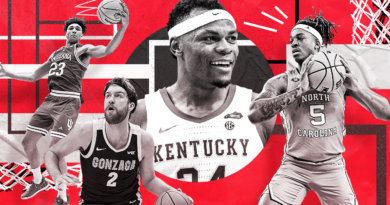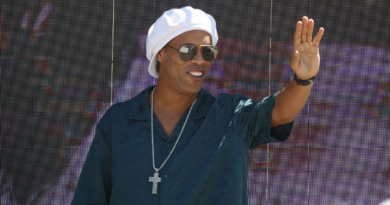Saints' first-round pick: Will they use the pick to get a QB?
NEW ORLEANS, La. – One question the New Orleans Saints will have to ponder now that they’re back in the first round of the draft: Do they use the pick on a quarterback?
The Saints came into the offseason with no first-round picks but now own the 29th pick as compensation for trading the rights to former coach Sean Payton’s contract to the Denver Broncos on Jan. 31.
The end of the first round isn’t an easy place to be when scouting a team’s most important position, but the Saints will have to turn over every stone after foundering on offense for two seasons.
New Orleans’ offense plummeted to 19th in scoring in 2021 and 22nd in 2022 in the two seasons since Drew Brees retired.
Saints assistant general manager Jeff Ireland admitted that he spoke with Brees prior to the 2021 season to ask him what made him so special for so long.
“I sat down with Drew before he left and said, ‘I’ve got to know this, what makes you exceptional?’ He said, ‘Processing speed, accuracy, getting the ball out,'” Ireland said. “So some of those are things you’re going to learn watching the tape and some of those you’re going to learn by sitting down and studying tape with him and getting to know the kid. But those are just a couple.
“There’s so many traits that you’re looking for at the quarterback position. And some guys have all of ’em — those usually go really early. Some guys have a few of ’em, and you’ve got to really evaluate, do a deep dive on those guys and find out what they’re made of.”
While the Saints are generally fairly tight-lipped about draft plans, even Ireland had to state the obvious at the Senior Bowl earlier in the month, where New Orleans had four assistants coaching in the game, including quarterbacks coach Ronald Curry.
“When we had Drew, you kind of knew you’re pretty much taken care of in that regard,” Ireland said. “We have one free agent quarterback, a practice squad quarterback under contract, so we do take it a little more serious this year because we need to find one.”
Replacing a future Hall of Famer isn’t easy. It’s a process that seemingly began almost a decade ago, when Brees turned 35 — at least that’s when speculation began that the Saints could be in the market for his replacement.
But Brees kept playing until he was 41, and the Saints never made a move on Day 1 of the draft to replace him.
New Orleans did take Garrett Grayson in the third round of the 2014 draft and Ian Book in the fourth round in 2021. Grayson spent the 2016 season on the practice squad and bounced around practice squads of a few teams before leaving football in 2019.
Book started one game in 2021 after all the Saints quarterbacks were placed on the COVID-19 list and was waived at the start of the 2022 season before spending the year on the Philadelphia Eagles‘ practice squad.
The closest they came to publicly admitting they were heavily considering the position was in 2017, when Payton said Patrick Mahomes would’ve been the pick at No. 11 if the Kansas City Chiefs had not selected him one pick prior.
The Saints also could have taken Deshaun Watson, whom they tried to trade for last offseason, but they chose to go with cornerback Marshon Lattimore. Watson was taken one pick later by the Houston Texans.
Saints general manager Mickey Loomis said in January that he believes a team generally needs to be in the top-five of the draft to get a guy they feel really good about. The Saints haven’t picked in that window since they took Reggie Bush with the second pick in 2006.
“Quarterback, in the history of the game, is generally one you have to take early,” Ireland said. “The Tom Bradys haven’t really been out there in the sixth round very often. We were able to acquire one in Dallas, Tony Romo in free agency, and that’s a little bit of the luck of the draw. But you usually select the really good ones early. There’s a reason why they’re up there in the top of the draft.”
Ireland said the Saints have also wanted to be more deliberate than taking swings at quarterbacks just because they can.
“It has to be the right guy,” Ireland said. “You don’t want to just be throwing darts. You want to be a lot more accurate and decisive on who the person is. Because I think we fall in love with quarterbacks really fast — and we fall out of love with quarterbacks very fast. So you have to be very deliberate in my opinion.”
Those circumstances have led the Saints to be somewhat stagnant in terms of a replacement plan.
Payton once said that the next quarterback was in the building, in reference to Taysom Hill and Jameis Winston, but that didn’t work out. Hill is now designated as a tight end, and although Winston winning the starting job over Hill in the 2021 offseason, he suffered a season-ending knee injury in Game 7.
The Saints re-signed Winston last offseason after the Watson trade didn’t pan out, but he eventually lost out on the starting job to Andy Dalton.
Loomis took a gamble last offseason when he sent the Saints’ original 2023 first-rounder to the Eagles to allow them to get wide receiver Chris Olave and offensive tackle Trevor Penning in the first round.
“We weren’t in [the top 5 of the draft] a year ago, and I certainly didn’t expect us to be in that position this year,” Loomis said.
Loomis said he’s happy with that decision, even though their 7-10 record would have had them picking at No. 10 come April. Either way, they would have been picking behind a long list of quarterback needy teams, including the Houston Texans (No. 2), Indianapolis Colts (No. 3), Las Vegas Raiders (No. 7) and Carolina Panthers (No. 9).
The Saints are certainly in a better position than they were a few weeks ago without a first-rounder, but the late pick on Day 1, combined with their aggressive history in free agency, likely means they’ll be trying to make moves to fix the quarterback situation long before the draft.
And if they do get to the point where a quarterback is a viable draft option, Ireland gave some insight on what else he might be looking for this spring.
“Quarterback is one of those positions where it’s an all-in evaluation,” Ireland said. “It’s not just me as the college director, it’s not just the coaches or head coach. It’s all-in. You’re looking for a very consistent evaluation on the quarterback position. We have to all be in on that particular evaluation and say, ‘Yeah, we all want this guy.’
“So whether he’s a running quarterback, a dual-threat quarterback — if you’re asking me directly, I like the dual-threat quarterbacks — but they got to be able to throw when they’re hurt. When they can’t move their legs, they’ve got to be able to throw.”




